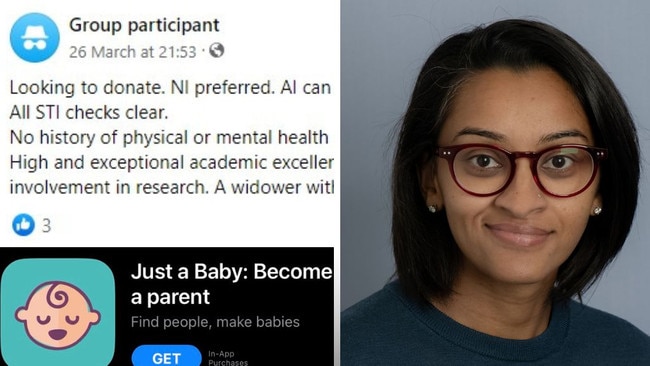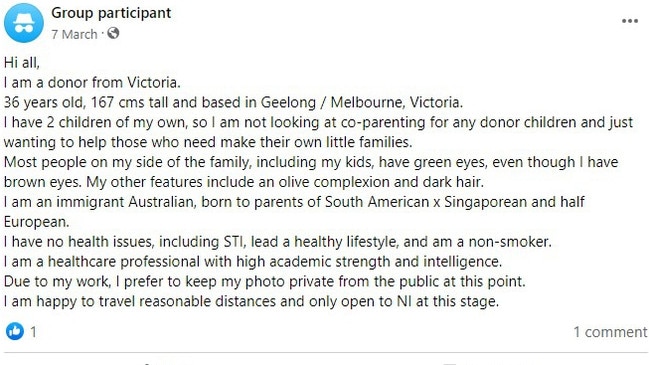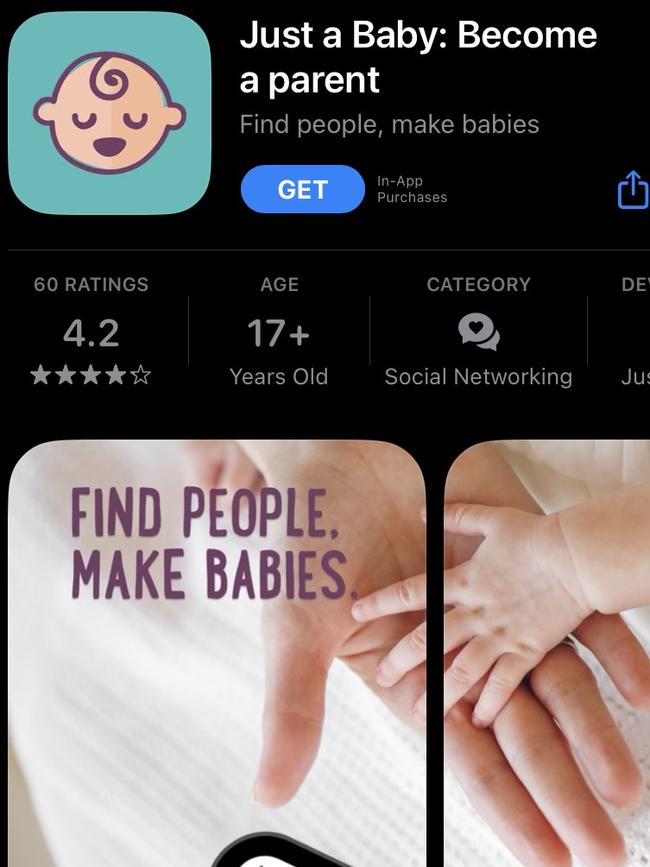Sperm donation apps, social media groups put children at risk | new research
More people are turning to social media groups and even mobile apps to find sperm donors but it’s putting vulnerable parents and children at risk, legal experts warn.

Geelong
Don't miss out on the headlines from Geelong. Followed categories will be added to My News.
Social media groups and apps searching for men including backpackers to donate sperm have turned the industry into a lawless “wild west”, researchers have warned.
Private Facebook groups, such as Sperm Donation Australia and Australia Backpackers seeking sperm, have been inundated with messages of followers offering to be or trying to find a donor.
One man in the group who claims to be a 36-year-old father-of-two from the Geelong region declared he had no STIs and was “happy to travel reasonable distances” to donate sperm.
Deakin Law School Associate Professor Neera Bhatia said a rise in single women and same-sex couples wanting to start families was likely driving demand for sperm donation through online platforms.
“Many groups struggle to access formal family creation services like … in vitro fertilisation (IVF),” Prof Bhatia said.
“This could be because of financial, medical or geographic barriers.
“The pandemic also resulted in a sharp drop in sperm donations, and a lack of diversity of donors available through regulated channels.”

Sperm Donation Australia has 17,000 members and averages eight posts a day while offset group Australia Backpackers seeking Sperm Donation has about 2300 members.
“We get many backpacker men wishing to donate and have a couple of children while travelling Australia. You can arrange petrol and travel money from your recipients and accommodation while they’re trying to conceive,” the group description read.
One post, from an anonymous group member, described physical attributes including height, eye and hair colour, their ethnic background and preferred relationship to the donor conceived child.

“I have two children of my own, so I am not looking at co-parenting for any donor children and just wanting to help those who need make their own little families,” the post from March, 2023 said.
“I have no health issues, including STI, lead a healthy lifestyle, and am a non-smoker.
“I am happy to travel reasonable distances and only open to NI (natural insemination or sexual intercourse) at this stage.”
An Australian-developed app, Just a Baby, operates like Tinder with a location driven swiping interface.

Both pathways avoid the use of regulated fertility clinics and related costs, plus potentially burdensome administrative and medical processes.
Prof Bhatia said the informal platforms raised legal issues, including ambiguity about child support or parental rights claims, and significant safety concerns.
She said there was a lack of requirement or ability to screen donated sperm.
“The obvious consequence is that unsafe and unscreened sperm with potential transmissible disease or other genetic conditions might be used, putting the recipient and the potential child at risk,” she said.
“There is also a level of uncertainty that the donated sperm belongs to the person professing to have made the donation.
“People seeking informal sperm donors online might also be risking their personal safety.
“There have been cases where women have been pressured towards natural insemination (sexual intercourse) by potential donors once they meet despite initially agreeing to artificial insemination.”
Prof Bhatia was the lead author of a research paper for the Adelaide Law Review law experts wrote about the rise in “informal family creation” creating a legal and ethical minefield.
In the paper, they outline a series of recommendations they say should be implemented as a national priority.
Prof Bhatia said laws and regulatory bodies must pay closer attention to family unit trends.
“Currently informal sperm donation is a kind of ‘wild west’ — a lawless state where nothing is governed or monitored,” Prof Bhatia said.
Originally published as Sperm donation apps, social media groups put children at risk | new research






